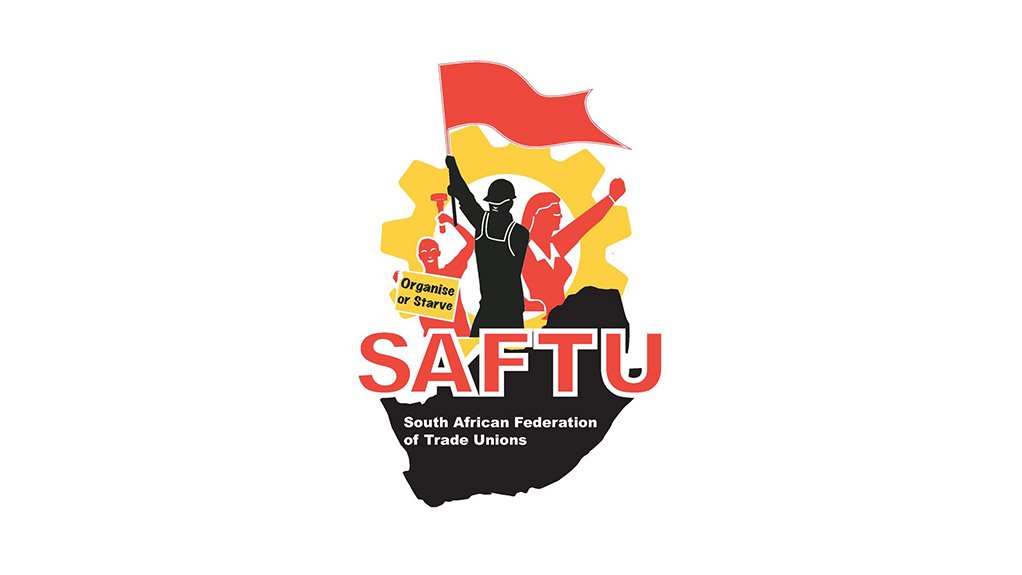/ MEDIA STATEMENT / The content on this page is not written by Polity.org.za, but is supplied by third parties. This content does not constitute news reporting by Polity.org.za.
The South African Federation of Trade Unions pledges its solidarity with the mineworkers at the Evander mine in Mpumalanga, who are the latest victims of the continuing job-loss bloodbath in the South African mining industry.
More than 30,000 jobs have been lost nationally since 2014, while net investment has declined 57% over the past decade. Lonmin announced in December 2017 that 12 600 jobs will need to be cut over the next 3 years, in addition to the 1 100 positions shed by the company in 2017.
Lonmin was then bought by Sibanye-Stillwater for R4 560 million. The new owners have confirmed that almost 6 976 job would be shed at the Cooke gold and uranium mine in Randfontein, as part of the restructuring of Cooke and Beatrix which were necessary to stem the cycle of losses at the mines.
Now 1722 workers face retrenchment at Evander. The employer, a subsidiary of Pan African Resources, has served the National Union of Mineworkers with a Section 189(3) notice of the Labour Relations Act to retrench the workers.
They claimed that the retrenchment of 1722 out of a total workforce of 1812 was a result of an old mine with deteriorating and inadequate infrastructure, high operating costs such as rising electricity, labour costs, and a low gold price.
Workers in three Mpumalanga Gupta-owned mines - Optimum, Koornfontein and Braakfontein - face a similar fate. Employees at all three are on strike after receiving no wages in February and their jobs are in the balance.
For 150 years mining has dominated the South African economy. Its colonial, white and capitalist owners have ruthlessly plundered our natural resources and shipped them overseas to make quick profits rather than beneficiating them to build local manufacturing industries.
They have ruthlessly exploited black, vulnerable migrant workers in dangerous and unhealthy mines. Thousands have died in accidents and hundreds of thousands from diseases contracted in their work. They have despoiled local communities and poisoned the environment.
Huge multinational companies have made millions of rands of profit, at the expense of workers’ health and lives, yet when the rate of profits starts to fall they just discard their workers, abandon death trap mineshaft and leave behind ravaged landscapes, polluted water and health hazards.
The industry is largely untransformed and the Chamber of Mines even rejected a new Mining Charter because it sought to raise the target for black ownership from 26% to a still minimal 30%, and even that proposal was hastily withdrawn by the then Minister, Gupta-linked Mosebenzi Zwane.
Linked to the soaring jobs losses is the explosion of so-called ‘illegal’ mining by desperate people from far and wide - the estimated 35 000 zama-zamas - who are prepared to risk their lives by going down dangerous, disused shafts to dig out a few grains of gold.
There is a direct link between the retrenchments of ‘legal’ mine workers and the zama zamas. As more and more workers are retrenched, the number of ‘illegals’ will rise. Their status must be legitimized and they can work in safe and healthy conditions.
These developments strengthen SAFTU’S call - in line with The Freedom Charter called for “The mineral wealth beneath the soil, the Banks and monopoly industry shall be transferred to the ownership of the people as a whole” - for the nationalisation of the mining industry, to take ownership out of the hands of the white monopoly capitalists who have wreaked such damage on workers, communities and the economy.
Together workers, communities and the unemployed must unite to campaign for nationalisation in which industries are democratically controlled from the bottom-up by representatives of workers and communities, to whom top officials are fully accountable for implementing mandates, so that mining can continue but with healthy and safe working conditions, living wages and profits being ploughed back into the community and the development of downstream manufacturing industry.
Issued by SAFTU
EMAIL THIS ARTICLE SAVE THIS ARTICLE ARTICLE ENQUIRY
To subscribe email subscriptions@creamermedia.co.za or click here
To advertise email advertising@creamermedia.co.za or click here











